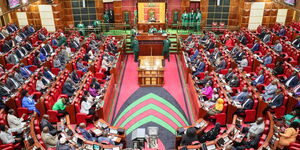Marriage in Kenya is governed by several rules and regulations contained in Marriage Act 2014, signed into law by President Uhuru Kenyatta.
The law recognises customary, Christian, Hindu, Islamic, and civil marriages.
Different unions have laws and rules that prescribe punishments and how to annul a marriage. Landmark rulings on divorce and sharing matrimonial property also act as marriage guidelines in Kenya.
According to Marriage Act 2014, proofs of marriage include a certificate of marriage, a certified copy of a certificate of marriage, an entry in a register of marriages and a certified copy of an entry in a register of marriages.
One of the little-known rules is bigamy. This is when a person undergoes a marriage ceremony while still married to another wife or husband who is still alive.
Furthermore, if a person’s first marriage has not been declared void in court, they are deemed to have committed bigamy. The offence of bigamy carries a 5-year prison term.
Rules on Dissolving Christian Marriages
Before filing for divorce in this case, the Act prescribes that the couple first ought to seek intervention from the church where the marriage was celebrated.
But if their differences are beyond irreconcilable, one may petition the court for dissolution in the case of mental or physical cruelty to the children.
The court may consider a marriage dissolution petition where one of the spouses is accused of desertion for more than three years.
When there is evidence of one or more cases of adultery. A marriage may also end if one of the spouses is sentenced to life or more than seven years.
Grounds for Dissolution of Civil Marriages
Civil marriages are performed, recorded and recognised by a government official or religious body.
Couples married through a civil union cannot petition the court before three years of celebration of marriage.
The Marriage Act allows them to file civil marriage dissolution in case of adultery, cruelty, desertion for at least three years, and irretrievable marriage breakdown.
"Matrimonial proceedings for the dissolution of a marriage may be adjourned for a period of not more than six for the court to make further enquiries or further attempts at reconciliation," the Act stipulates.
Grounds for Dissolution of Hindu Marriages
Hindu marriages follow their prescribed religious standards. But the Marriage Act defines grounds which may allow a couple to end their union.
Grounds for Hindu marriage dissolution include when it is irretrievable broken down, desertion, conversion to a different religion, sodomy, bestiality or adultery and cruelty.
For Islamic marriages, they follow the Islamic laws, which are decreed by a Kadhi, Sheikh or Imam and then delivered to the Registrar.
In the case of monogamous marriage, one of the parties can file for divorce if they discover their partner married to another person at the time of the marriage.
If one of the parties fails to show up during the marriage celebration, that union can be dissolved.
"Pregnancy at the time of the marriage without the knowledge of the husband where the husband is not responsible for the pregnancy; or the other party suffers recurrent bouts of insanity at the time of the marriage, and without the knowledge of the petitioner," the Marriage Acts stipulates in part.
Spouse Maintenance
The court can order spouse maintenance where the person has refused or neglected to provide for the spouse or former spouse.
When a person has deserted the other spouse or former spouse and where a foreign court has given a decree.
Maintenance and child support is, however, determined by the judge.












